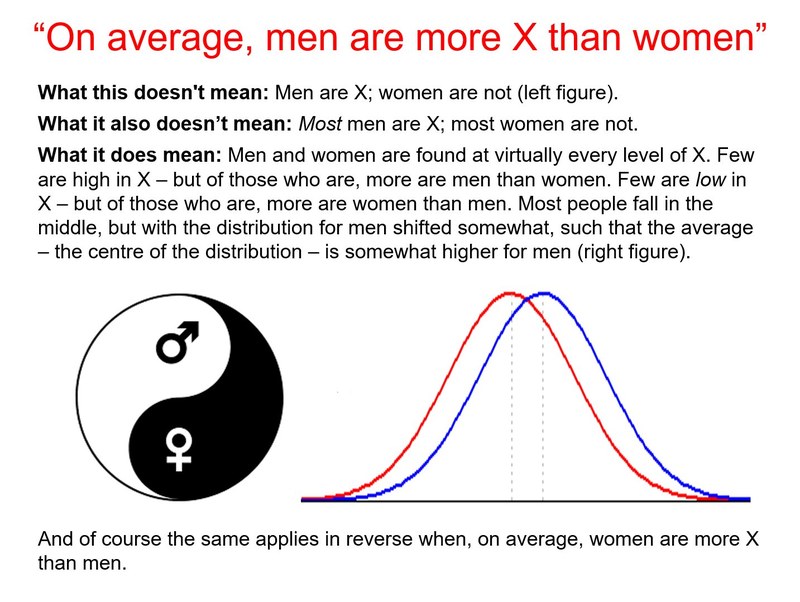 large.jpg
large.jpg
Everything you've always wanted to know about sex differences but were afraid to ask
A very condensed summary of the scientific literature on sex differences.

"Everyone knows that men and women are different… except social scientists." –Unknown
Before we get started, a caution: It's easy to misunderstand claims about sex differences. The screenshot below explains what scientists mean – and don't mean – when they say that, on average, men are more X than women (or vice versa — see page 268 of The ape that kicked the hornet's nest for more on the subject).

With that in mind, let's look at some well-established sex differences. First, on average, men are more interested than women in casual sex and sexual variety (which isn't to say "Men are promiscuous, women monogamous"; see Keeping it Casual on Quillette).

On average, men place more weight than women on a long-term mate's looks (although notice that looks are pretty important to both sexes), whereas women place more weight than men on a mate's wealth and status (see Evolutionary Psychology: The New Science of The Mind, page 108).


On average, men engage in more direct aggression than women (and are also more often victims of aggression). See the book The Ape that Understood the Universe for more on that. The following figure is from the Global study on homicide 2013.


On average, women are more involved in childcare than men (although note that men are generally a lot more involved than most male mammals). See Father-Child Relations and The Ape that Understood the Universe.


On average, men are more interested than women in occupations involving things, whereas women are more interested than men in occupations involving people. See Men and Things, Women and People: A Meta-Analysis of Sex Differences in Interests as well as Men, Women and Science: Why the Differences and What Should Be Done?

Age trends: Sex differences are often larger among teens and young adults than among other age groups. This applies, for instance, to sex differences in alcohol consumption, fireworks-related hospitalizations, cycling fatalities, and homicide rates.




Most human sex differences are relatively modest at the mean. See The Ape That Thought It Was a Peacock. However, even small differences at the mean are generally associated with much larger differences at the extremes of the distribution. See Men, Women and Science.

For many traits, males are more variable than females: The male distribution is slightly flatter and stretches out somewhat further on both sides of the mean. See Men, Women and Science as well as this Twitter thread.

Are sex differences such as those above a product of nurture alone? Or is there also an innate contribution? Various lines of evidence suggest the latter.
First, many of these differences appear across cultures. From The Ape that Understood the Universe:

Second, contrary to the idea that sex differences are a product of gender roles, cultures with stricter gender roles tend to have *smaller* sex differences, not larger ones.
E.g., sex differences in STEM representation.


Third, many sex differences have been convincingly linked to prenatal hormonal exposure. See The Ape that Understood the Universe for more information. Table from The Science on Women and Science:


And fourth, many sex differences are found as well in other animals – animals that resemble us in evolutionarily relevant ways.

What selection pressures might have shaped these sex differences? Most trace back to another, more fundamental difference: the sex difference in reproductive variability. See, e.g., Are humans peacocks or robins? and page 62 of The Ape that Understood the Universe. This figure is from the Demography of the Dobe !Kung:

One last point: If certain sex differences really do have an evolutionary origin, what are the implications?

We are different — both as individuals, and as members of groups. Our differences aren't to be cured, forced away, or nullified. They are here to be respected and celebrated.
Source for this information: Twitter thread By Steve Stewart-Williams.
 large.jpg
large.jpg
 Empirical findings relevant to evaluating sex differences in desires for sexual variety
Empirical findings relevant to evaluating sex differences in desires for sexual variety
 Desire for physical attractiveness in a long-term mate.jpg
Desire for physical attractiveness in a long-term mate.jpg
 Preference for good financial prospects in a marriage partner.jpg
Preference for good financial prospects in a marriage partner.jpg
 The evidence for these differences is easy to find.jpg
The evidence for these differences is easy to find.jpg
 Percentage of male and female homicide victims.jpg
Percentage of male and female homicide victims.jpg
 Involvement in child care, coda.jpg
Involvement in child care, coda.jpg
 Men and Things, Women and People.jpg
Men and Things, Women and People.jpg
 Average alcohol comsumption per age.jpg
Average alcohol comsumption per age.jpg
 Involvement in child care.jpg
Involvement in child care.jpg
 Fatalities with fireworks.jpg
Fatalities with fireworks.jpg
 Deaths by bicycle.jpg
Deaths by bicycle.jpg
 Homicide rates.jpg
Homicide rates.jpg
 Sex differences mean vs tail.jpg
Sex differences mean vs tail.jpg
 Greater male variability in traits.jpg
Greater male variability in traits.jpg
 What would an alien scientist make of human sex differences.jpg
What would an alien scientist make of human sex differences.jpg
 It's not just personality.jpg
It's not just personality.jpg
 Women among STEM graduates.jpg
Women among STEM graduates.jpg

